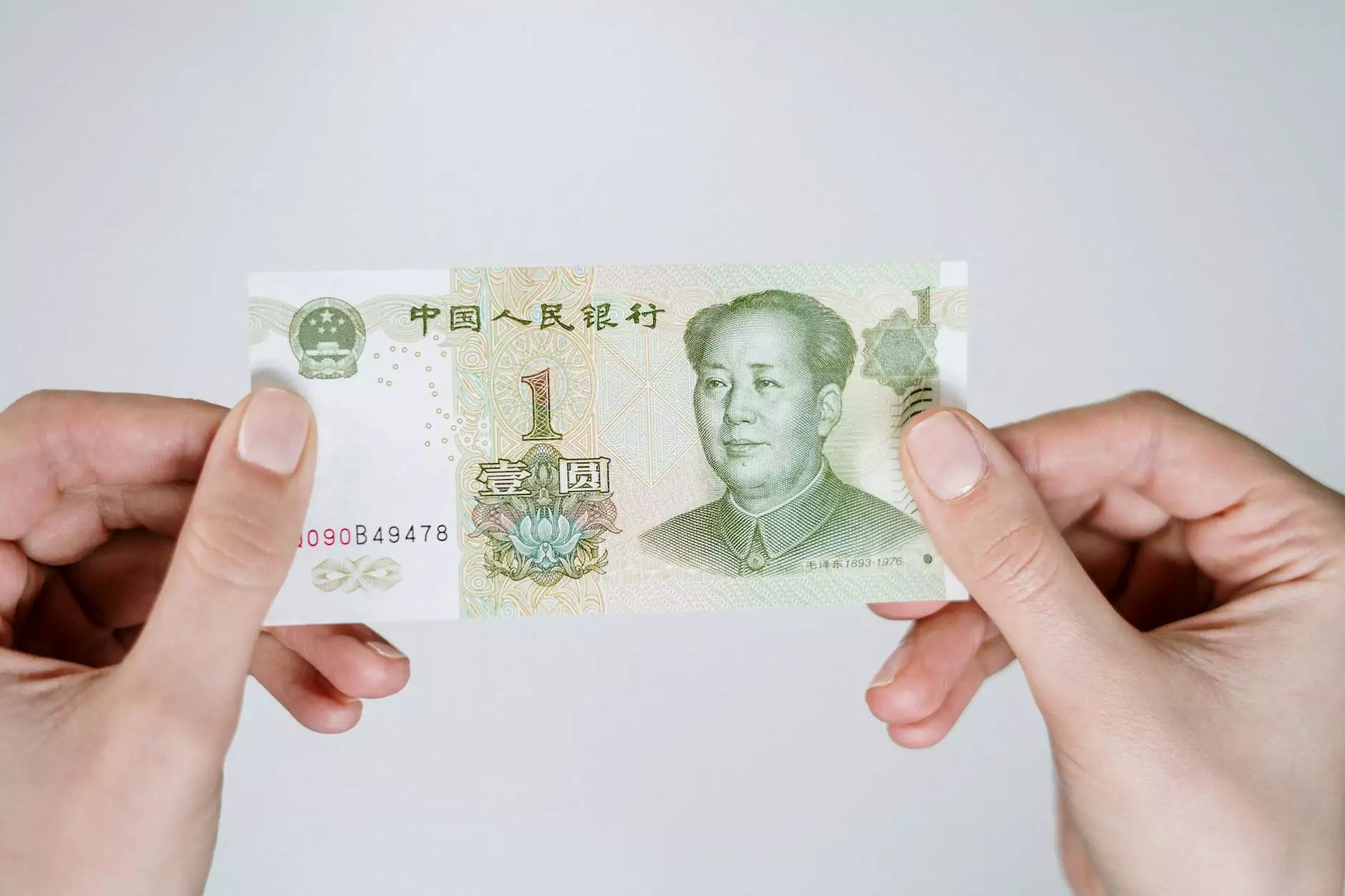The Thriving Business of Chinese Currency

The global economy is a complex web of transactions, investment, and commerce. Among the myriad currencies traded, one has emerged not only as a crucial player in Asia but also on the global stage: the Chinese Yuan (Renminbi). In this article, we will explore the intricacies of the Renminbi, understand its significance in international trade, and shed light on essential topics such as counterfeit money and fake documents.
1. Understanding the Chinese Yuan (Renminbi)
The Renminbi (RMB), commonly known as the Yuan, is the official currency of the People's Republic of China. Introduced in 1948, the Renminbi has evolved into one of the most traded currencies in the world. Understanding its structure and significance is critical for anyone interested in the Chinese economy.
1.1 The Structure of the Renminbi
The Renminbi operates under a controlled floating exchange rate regime. This means that the value of the Yuan is influenced by government policies, market demand, and international trade. The currency is divided into several denominations, including:
- 1 Yuan (¥1)
- 5 Jiao (¥0.50)
- 10 Jiao (¥1)
- 20 Yuan (¥20)
- 100 Yuan (¥100)
The largest denomination, the 100 Yuan note, is often used in both personal and business transactions.
1.2 The Role of the Yuan in International Trade
Over recent years, the Yuan has gained considerable traction as a global currency for international trade. China's status as a manufacturing hub has propelled the Yuan to the forefront of global commerce. More countries are beginning to accept the Yuan in trade agreements, which is a testament to China's growing economic influence.
2. The Impact of Counterfeit Money on Businesses
While the Renminbi is integral to the Chinese economy, it is not without its challenges. One of the most significant problems facing businesses in China and abroad is counterfeit money. Counterfeit Yuan can seriously impact companies by diminishing trust and leading to substantial financial losses.
2.1 Understanding Counterfeit Currency
Counterfeit currency refers to imitation money that is produced for the purpose of deception. In recent years, the sophistication of counterfeiters has increased, leading to more realistic fakes that can evade detection by the unsuspecting.
2.2 Consequences of Counterfeit Money
Businesses that unknowingly accept counterfeit notes can face a range of consequences, including:
- Financial Losses: Direct financial loss occurs when counterfeit notes are accepted during transactions.
- Legal Issues: Accepting counterfeit money can lead to legal repercussions, including fines and loss of business licenses.
- Tarnished Reputation: A business found to have accepted counterfeit money may suffer from damaged reputation and lost customer trust.
3. Mitigating the Risks of Counterfeit Currency
To protect their businesses from counterfeit currency, companies must take proactive measures. Here are some effective strategies:
3.1 Education and Training
Employees should be trained to identify counterfeit bills. Knowing the features of genuine Yuan currency, such as watermarks and security threads, can help in spotting fakes.
3.2 Use of Technology
Investing in advanced technologies such as currency detectors and scanners can significantly reduce the risk of accepting counterfeit money. These machines are designed to quickly analyze and verify notes against known security features.
3.3 Establishing Clear Policies
Establishing stringent policies regarding the acceptance of currency can deter the circulation of counterfeit notes, creating an internal culture of vigilance.
4. The Use of Fake Documents in Business Transactions
In parallel to concerns over counterfeit money, businesses must also be wary of fake documents. These documents can range from false identification to counterfeit contracts.
4.1 Types of Fake Documents
- Identity Documents: Fake IDs can be used to commit fraud or acquire services and products unlawfully.
- Business Licenses: Some scammers may produce fake business licenses to gain credibility.
- Contracts: Falsified contracts can lead to severe legal ramifications for businesses.
4.2 Protecting Against Fake Documents
The consequences of dealing with fake documents can be dire, including financial losses and legal troubles. Here are a few strategies to mitigate these risks:
4.2.1 Verification Processes
Adopting rigorous verification processes for all documentation can help safeguard your business. This can include verifying the authenticity of identity documents or ensuring that business licenses have not expired.
4.2.2 Education and Awareness
Educating staff about the common signs of fake documents will lower the chances of them inadvertently accepting fraudulent materials.
5. The Future of the Renminbi in Global Markets
As we look to the future, the Renminbi is poised for even greater significance in global markets. The International Monetary Fund (IMF) has recognized the Yuan as a global reserve currency, placing it among the currencies used for international trade.
5.1 Growing International Acceptance
More countries are entering agreements with China to trade in Yuan, reducing reliance on traditional currencies like the US Dollar. This trend not only enhances the Yuan's credibility but also reflects China's growing economic clout.
5.2 The Digital Yuan
China is also at the forefront of digital currency innovations with the introduction of the Digital Yuan. This digital currency has the potential to revolutionize transactions, making them faster and more secure.
6. Conclusion
In conclusion, the world of Chinese currency, particularly the Renminbi, is a fascinating arena that reflects the complexities of the global economy. As businesses navigate the intricacies of the financial landscape, understanding the implications of counterfeit money and fake documents becomes essential.
By implementing effective strategies to safeguard against these risks, companies can not only protect their financial interests but also contribute to the overall integrity of the market. As the Renminbi continues to evolve, its role in international trade is only set to increase, making it imperative for business professionals to stay informed and adaptable to these changes.
For more information and products related to the Renminbi, visit High Tech Lab for reliable and in-depth resources.
https://www.highteclab.com/product-category/chinese-yuan-renminbi/







